Incoterms国际贸易术语中英文对照解释(全)(2020年8月整理).pdf
国际贸易术语解释通则INCOTERMS2020最新版中文详解

国际贸易术语解释通则INCOTERMS2020最新版中文详解国际贸易术语解释通则2020版国际贸易术语也叫价格术语,是外贸从业人员必备的基础知识之一。
国际贸易术语是由三个英文缩写字母来表示商品的价格构成、说明交易地点、确定买卖双方的责任、费用、风险划分等问题的专门用语。
由国际商会(ICC)于1936年起草,后经由多次修正发展至今,目前已经更新至2020年版本,新版已于2020年1月1日生效施行。
新版的国际贸易术语分成2类、4组、11个贸易术语:2类:适用于任何运输方式(EXW、FCA、CPT、CIP、DAP、DPU、DDP);仅适用海运(FOB、FAS、CFR、CIF)。
4组:C组、D组、E组、F组。
11个术语:EXW、FOB、FAS、FCA、CFR、CIF、CPT、CIP、DAP、DPU、DDP等。
EXW - 工厂交货由销售方在其工厂所在地或其他指定地点准备好货物并交付给采购方。
采购方承担货物交付后起至采购方工厂所在地期间的所有费用和风险。
交付地点:销售方所在地的工厂仓库或其指定地。
供应商承担:费用:将货物装至采购方指定运输车辆上的搬卸费。
风险:无风险其他文件手续:协助采购方办理出口、进口海关所需的一切文件,如:商业发票、装箱单、原产地证明、有害物质清单等。
采购方承担:费用:货物交付后的一切费用,如:运输费、保险费、出口国和进口国的关税等。
风险:货物交付后的一切风险,如:货物灭失被盗、限制出口或进口等。
FOB - 装运港船上交货由销售方将货物交付至采购方指定的船上。
采购方承担货物交付后起至采购方工厂所在地期间的所有费用和风险。
交付地点:销售方所在地装运港的船甲板上。
供应商承担:费用:工厂仓库至装运港的船甲板上期间的运输、装卸费。
风险:工厂仓库至装运港的船甲板上期间的一切风险。
其他文件手续:需准备出口所需的一切文件,如:商业发票、装箱单、原产地证明、有害物质清单等。
采购方承担:费用:货物交付后的一切费用,如:运输费、保险费、出口国和进口国的关税等。
国际贸易术语解释通则2020 pdf

国际贸易术语解释通则国际贸易术语解释通则,2020(Incoterms®(2020)是国际商会制定的一部规则国际贸易中使用的术语的国际性准则。
这些术语简化了交易过程,帮助买卖双方明确各自的责任和风险。
以下是其主要特点及一些常见术语的解释:1.(EXW(厂交交)):卖方在厂交或厂场将)物交给买方指定的承运人或其他人。
在此术语下,卖方承担最小责任,即确保)物在交付前完好无损。
2.(FCA )交承运人):卖方将)物交付给买方指定的承运人,并承担)物在交付前的一切风险。
3.(CPT 运费付至目的地):卖方将)物运送到指定目的地,并确保)物被交给当地的承运人,运费已支付。
4.(CIP 运费和保险付至目的地):卖方负责办理运输并支付保险费用,将)物运送到目的地。
5.(DAT 运输+目的地交)):卖方负责将)物从指定地点运送到目的地,并承担)物在途中的风险。
6.(DAP 目的地交)):卖方将)物交给买方指定的承运人在指定的目的地,卖方承担)物在途中的风险。
7.(DDP 完税后交)):卖方将)物在目的地的海关完成清关并交付给买方,卖方承担所有的清关费和进口税。
这些术语的选择取决于许多因素,包括运输方式、)物性质、关税和保险费用等。
在选择术语时,买卖双方应充分考虑各自的义务和责任,以确保贸易的顺利进行。
此外,Incoterms®(2020与其他贸易规则一样,也可能会因地区而异,因此在具体交易中应与当地的供应商或客户确认适用条款。
这些术语的使用也反映了当前国际贸易的复杂性和多样性。
随着贸易规则和运输方式的不断变化,Incoterms®(2020也将不断更新和改进,以适应新的挑战和机遇。
总的来说,国际贸易术语解释通则,2020(Incoterms®(2020)是一套实用的规则,它简化了国际贸易过程,明确了买卖双方的职责,帮助双方在复杂的贸易环境中做出明智的决策。
Incoterms-2010-国际贸易术语中英文对照解释(全)
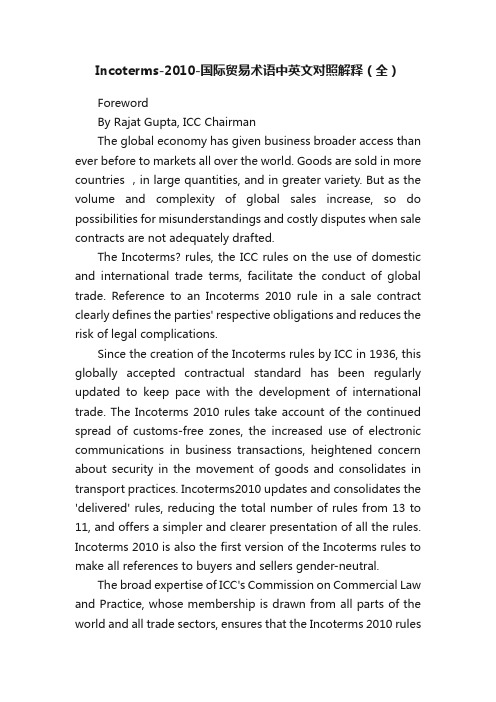
Incoterms-2010-国际贸易术语中英文对照解释(全)ForewordBy Rajat Gupta, ICC ChairmanThe global economy has given business broader access than ever before to markets all over the world. Goods are sold in more countries ,in large quantities, and in greater variety. But as the volume and complexity of global sales increase, so do possibilities for misunderstandings and costly disputes when sale contracts are not adequately drafted.The Incoterms? rules, the ICC rules on the use of domestic and international trade terms, facilitate the conduct of global trade. Reference to an Incoterms 2010 rule in a sale contract clearly defines the parties' respective obligations and reduces the risk of legal complications.Since the creation of the Incoterms rules by ICC in 1936, this globally accepted contractual standard has been regularly updated to keep pace with the development of international trade. The Incoterms 2010 rules take account of the continued spread of customs-free zones, the increased use of electronic communications in business transactions, heightened concern about security in the movement of goods and consolidates in transport practices. Incoterms2010 updates and consolidates the 'delivered' rules, reducing the total number of rules from 13 to 11, and offers a simpler and clearer presentation of all the rules. Incoterms 2010 is also the first version of the Incoterms rules to make all references to buyers and sellers gender-neutral.The broad expertise of ICC's Commission on Commercial Law and Practice, whose membership is drawn from all parts of the world and all trade sectors, ensures that the Incoterms 2010 rulesrespond to business needs everywhere defines the parties' respective obligations and reduces the risk of legal complications.ICC would like to express its gratitude to the members of the Commission, chaired by Fabio Bortolotti (Italy), to the Drafting Group, which comprised Charles Debattista (Co-Chair, France), Jens Bredow (Germany), Johnny Herre (Sweden), David Lwee (UK), Lauri Railas (Finland), Frank Reynolds (US),and Miroslav Subert (Szech Republic), and to Asko Raty (Finland) for assistance with the images depicting the 11 rules.前言国际商会主席Rajat Gupta全球经济一体化使得商业通向世界各地市场的途径空前宽广。
INCO Terms国际贸易术语总结 ppt课件

ppt课件
6
EXW
EXW(EX works):工厂交货(指定地点)。
是指卖方将货物从工厂(或仓库)交付给买方, 除非另有规定,卖方不负责将货物装上买方安 排的车或船上,也不办理出口报关手续。买方 负担自卖方工厂交付后至最终目的地的一切费 用和风险。
ppt课件
7
FCA/FAS/FOB
FCA(Free Carrier):货交承运人(指定地点)。
“F”组(FCA、FAS和FOB),指卖方需将货物交 至买方指定的承运
ppt课件
5
“C”组(CFR、CIF、CPT和CIP),指卖方须订立 运输合同,但对货物灭失或损坏的风险以及 装船和启运后发生意外所产生的额外费用, 卖方不承担责任(主要运费已付)。
“D”组(DAF、DES、DEQ、DDU和DDP),指 卖方须承担把货物交至目的地国所需的全部 费用和风险(货到)。
DAF(Delivered at Frontier):边境交货(指定地 点)。
是指卖方将货物运至买方指定的边境地点,将
仍处于交货的运输工具上尚未卸下的货物交付
买方,并办妥货物出口清关手续,承担将货物
运抵边境上的指定地点所需的一切费用和风险,
此地点为毗邻边境的海关前,包括出口国在内
的任何国家边境(含过境国)。进口清关手续
是指卖方支付货物运至指定目的地的运费,在 货物被交由承运人保管时,货物灭失或损坏的 风险,以及由于在货物交给承运人后发生的事 件而引起的额外费用,即从卖方转移至买方。
ppt课件
13
CFR/CIF/CPT/CIP
CIP(Carriຫໍສະໝຸດ ge and Insurance Paid to):运费、保 险费付至(指定目的地)。
incoterms--国际贸易术语中英文对照解释(全)

EXW (insert named place of delivery)GUIDANCE NOTEThis rule may be used irrespective of the mode of transport selected and may also be used where more than one mode of transport is employed.It is suitable for domestic trade, while FCA is usually more appropriate for international trade.“Ex Works” means that the seller delivers when it places the goods at the disposal of the buyer at the seller’s premises or at another named place ., works, factory, warehouse, etc.). The seller does not need to load the goods on any collecting vehicle, nor does it need to clear the goods for export, where such clearance is applicable.The parties are well advised to specify as clearly as possible the point within the named place of delivery, as the costs and risks to that point are for the account of the seller. The buyer bears all costs and risks involved in taking the goods from the agreed point, if any, at the named place of delivery. EXW represents the minimum obligation for the seller. The rule should be used with care as:a) The seller has no obligation to the buyer to load the goods, even though in practice the seller maybe in a better position to do so. If the seller does load the goods, it does so at the buyer’s risk and expense. In cases where the seller is in a better position to load the goods, FCA, which obliges the seller to do so at its own risk and expense, is usually more appropriate.b) A buyer who buys from a seller on an EXW basis for export needs to be aware that the seller has anobligation to provide only such assistance as the buyer may require to effect that export: the seller is not bound to organize the export clearance. Buyers are therefore well advised not to use EXW if they cannot directly or indirectly obtain export clearance.c) The buyer has limited obligations to provide to the seller any information regarding the export ofthe goods. However, the seller may need this information for, ., taxation or reporting purposes. EXW——工厂交货(……指定地点)本条规则与(当事人)所选择的运输模式无关,即便(当事人)选择多种运输模式,亦可适用该规则。
inco terms的英文表达

"Incoterms" 是国际商会(International Chamber of Commerce,简称 ICC)发 布的国际贸易术语,用于规定国际货物贸易中卖方和买方之间的责任和义务, 以及货物交付的方式和时机。这些术语有助于在不同国家和文化之间进行贸易 时的沟通和理解。以下是 Incoterms 的英文表达:
• EXW (Ex Works): Ex Works • FCA (Free Carrier): Free Carrier • CPT (Carriage Paid To): Carriage Paid To • CIP (Carriage and Insurance Paid To): CarDAP (Delivered at Place): Delivered at Place • DPU (Delivered at Place Unloaded): Delivered at Place Unloaded • DDP (Delivered Duty Paid): Delivered Duty Paid • FAS (Free Alongside Ship): Free Alongside Ship • FOB (Free on Board): Free on Board • CFR (Cost and Freight): Cost and Freight • CIF (Cost, Insurance and Freight): Cost, Insurance and Freight
Incoterms 国际贸易术语通则

《国际贸易术语解释通则》 Incoterms
A: Incoterms
是由设于巴黎的国际商会(International Chamber of Commerce -INCO)于1936年修订,最新为2000版国际贸易术语解释通则。
B:目的
为参与国际商业活动的采购者和销售者提供一种标准化的贸易语言。
C:(Incoterms )的分类: 四大组、十三类
1、风险划分界限:一栏只能体现风险的主要原则,但是在特定情况下,存在例外
2、保险办理:表明谁有义务订立保险合同,并承担保险费。
3、出口报关:一栏在本表中意指由谁承担风险和费用以取得任何出口许可证和其他官方许可,并在需要办理海关手续时, 办理该手续,并承担海关手续费用以及出口应当交纳的一切关税、税款和其他费用。
4、进口报关:本表中意指由谁承担风险和费用以取得任何出口许可证和其他官方许可,并在需要办理海关手续时,办理 货物进口和从他国过境的一切手续,并承担海关手续费用以及进口应当交纳的一切关税、税款和其他费用
\\dc1\
物流中心_dc1\05
\\dc1\
物流中心_dc1\05
\\dc1\
物流中心_dc1\05
C:\Documents and Settings\si
\\dc1\
物流中心_dc1\05。
2020年国际贸易术语解释
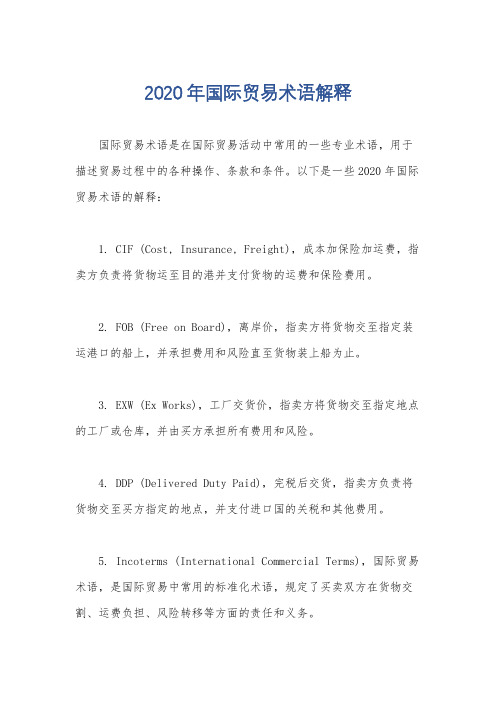
2020年国际贸易术语解释
国际贸易术语是在国际贸易活动中常用的一些专业术语,用于描述贸易过程中的各种操作、条款和条件。
以下是一些2020年国际贸易术语的解释:
1. CIF (Cost, Insurance, Freight),成本加保险加运费,指卖方负责将货物运至目的港并支付货物的运费和保险费用。
2. FOB (Free on Board),离岸价,指卖方将货物交至指定装运港口的船上,并承担费用和风险直至货物装上船为止。
3. EXW (Ex Works),工厂交货价,指卖方将货物交至指定地点的工厂或仓库,并由买方承担所有费用和风险。
4. DDP (Delivered Duty Paid),完税后交货,指卖方负责将货物交至买方指定的地点,并支付进口国的关税和其他费用。
5. Incoterms (International Commercial Terms),国际贸易术语,是国际贸易中常用的标准化术语,规定了买卖双方在货物交割、运费负担、风险转移等方面的责任和义务。
以上是2020年国际贸易术语的一些解释,这些术语在国际贸易中起着重要的作用,帮助买卖双方明确各自的责任和权利,确保贸易顺利进行。
国际贸易条款汇总(Incoterms@2020)

国际贸易条款汇总(Incoterms2020)文档一:Incoterms2020 国际贸易条款汇总1. EXW(卖方工厂)- EX Works(named place of delivery):卖方把货物交给买方或第三方指定的地点,买方负责所有运输和保险事宜。
2. FCA(装运港或内陆点)- Free Carrier(named place of delivery):卖方把货物交给指定地点的承运人,卖方负责准备、装载和清关手续。
3. CPT(目的地港或内陆点)- Carriage Pd To(named place of destination):卖方负责将货物交给指定目的地的承运人,并负担运费。
4. CIP(目的地港或内陆点)- Carriage and Insurance PdTo(named place of destination):卖方负责将货物交给指定目的地的承运人,并负担运费和货物保险费。
5. DAP(目的地港或内陆点)- Delivered at Place(named place of destination):卖方负责将货物交付到指定目的地的地方,买方负责卸货和清关手续。
6. DPU(目的地港或内陆点)- Delivered at Place Unloaded (named place of destination):卖方负责将货物交付到指定目的地的地方,并负责卸货。
7. DDP(目的地港或内陆点)- Delivered Duty Pd(named place of destination):卖方负责将货物交付到指定目的地的地方,并负责卸货、清关和支付所有相关费用。
8. FAS(装运港)- Free Alongside Ship(named port of shipment):卖方负责将货物交付到指定港口的码头旁边,买方负责装载货物和负担所有费用。
9. FOB(装运港)- Free on Board(named port of shipment):卖方负责将货物交付到指定港口的船上,买方负责负担装载货物和所有费用。
2020国际贸易术语解释规则全文
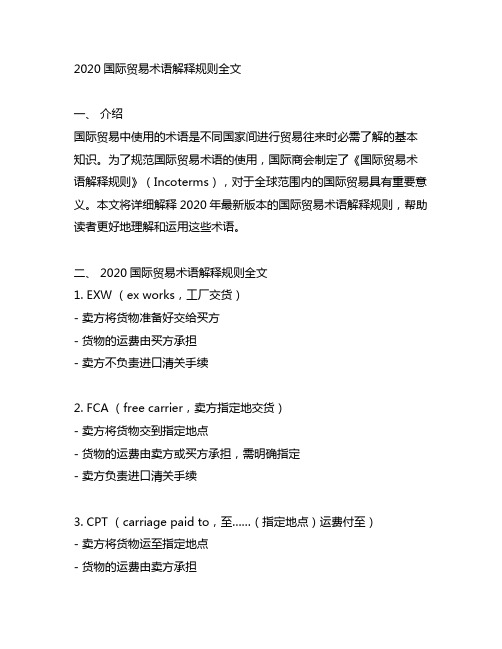
2020国际贸易术语解释规则全文一、介绍国际贸易中使用的术语是不同国家间进行贸易往来时必需了解的基本知识。
为了规范国际贸易术语的使用,国际商会制定了《国际贸易术语解释规则》(Incoterms),对于全球范围内的国际贸易具有重要意义。
本文将详细解释2020年最新版本的国际贸易术语解释规则,帮助读者更好地理解和运用这些术语。
二、 2020国际贸易术语解释规则全文1. EXW (ex works,工厂交货)- 卖方将货物准备好交给买方- 货物的运费由买方承担- 卖方不负责进口清关手续2. FCA (free carrier,卖方指定地交货)- 卖方将货物交到指定地点- 货物的运费由卖方或买方承担,需明确指定- 卖方负责进口清关手续3. CPT (carriage paid to,至……(指定地点)运费付至)- 卖方将货物运至指定地点- 货物的运费由卖方承担4. CIP (carriage and insurance paid to,至……(指定地点)运费及保险费付至)- 卖方将货物运至指定地点并购买运输保险- 货物的运费和保险费由卖方承担- 卖方负责进口清关手续5. DAP (delivered at place,交货地点)- 卖方将货物交至指定地点- 货物的进口清关手续由卖方承担- 买方负责货物的进出口运费和保险费以及目的地的进口清关手续6. DPU (delivered at place unloaded, 交货地点(卸货))- 卖方将货物运至指定地点进行卸货- 进出口运费和保险费由买方承担7. DDP (delivered duty paid, 交货地点(已完税))- 卖方将货物运至指定地点,并负责进口清关手续和付清进口税费- 买方只需负责货物的出口运费和保险费8. FAS (free alongside ship, 船边交货)- 卖方将货物交至指定的码头,买方负责将货物装上船9. FOB (free on board, 离岸价格)- 卖方将货物运到指定港口,并负责将货物装上船- 卖方负责出口清关手续10. CFR (cost and freight, 成本加运费)- 卖方将货物运至目的港口,并负责将货物装上船- 买方负责目的港口的进口清关手续11. CIF (cost, insurance and freight, 成本、保险费加运费)- 卖方将货物运至目的港口,并购买运输保险- 买方负责目的港口的进口清关手续三、结语国际贸易术语解释规则对于国际贸易的顺利进行具有重要意义。
最新贸易术语 Incoterms 2020
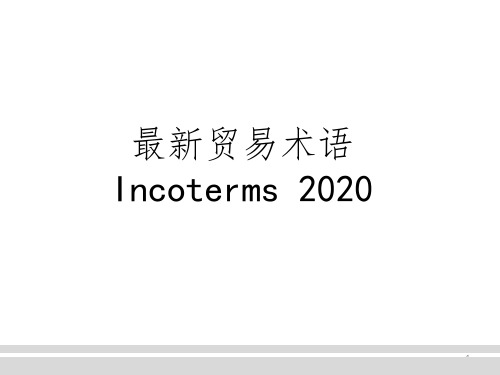
交货地点:买方所在地的指定地点
风险的转移:装在运输工具上的货物(不用卸载)交给买方
责任与费用的划分:
出口清关 Seller
运输费用 Seller
保险费用 Seller
进口清关 Buyer
适用于任何运输方式或联运,例如海运+铁路运输/内陆货运,通常铁 路运输中货物到达目的地,或者将运输工具如货车交由买方后 (Seller 不用负责卸货),即完成交货并发生风险转移。
14
CFR和CIF在一定程度上能够规避合同履行风险或海运欺诈风险
案例一:在FOB术语及L/C付款方式下,买方由于某些市场原因如价格下跌或需求 减少等,刻意拖延订船,卖方无法如期完成交货,导致L/C出现不符点甚至L/C过期 失效,此风险由卖方承担。但如果是CFR或CIF术语下,由卖方自行找货代,卖方 履行好合同上的义务并如期出货后,即可通过L/C收汇。
FOB只适用于水路运输,如海运和河运。承运人由Buyer指定。
9
案例:2020年1月初,中远海运公司一艘集装箱大船 “COSCO PACIFIC ” 从马来西亚驶往印度,发生集装箱起火事件,起火的原因是瞒报的锂电池 引发自燃的。 请问:在FOB术语下,集装箱在船上起火而导致的货物损失,是属于买方 的损失还是卖方的?
CIP: Carriage & Insurance Paid to (…named place of destination) 运费保险费付至(指定目的地)
交货地点:指定装运地点
风险的转移:货交承运人
责任与费用的划分:
出口清关 Seller
运输费用 Seller
保险费用 Seller
进口清关 Buyer
Buyer承担,因为在EXW下,Buyer在Seller工厂收货后,风险已转移。
incoterms2020国际贸易术语中文

incoterms2020国际贸易术语中文什么是INCOTERMS2020?INCOTERMS,即国际贸易术语(International Commercial Terms),是国际商会(ICC)制定的一套国际贸易术语。
INCOTERMS旨在规范国际贸易中买卖双方的义务和责任分担,并明确各方的权益和义务。
INCOTERMS对于国际贸易非常重要,可以帮助贸易交易的各方沟通和理解贸易条件,避免歧义和纠纷。
INCOTERMS2020是继2010年版INCOTERMS之后的最新版本,于2020年1月1日生效。
INCOTERMS2020相较于前一版进行了一些重要变更,以保持其与国际贸易实践的一致性。
INCOTERMS2020中文译名为国际贸易术语,将贸易中涉及的各方责任和义务分成了11个术语,每个术语代表了一种可能的贸易条件。
它们为买卖双方提供了明确的指导,包括货物的交付地点、运输方的选择、各方的风险和成本承担等。
将INCOTERMS2020纳入贸易合同中,可以帮助双方在合同履行过程中更好地理解彼此的权益和义务,避免误解和纠纷的发生。
下面,我们将逐步回答关于INCOTERMS2020的一些常见问题:第一步:为什么INCOTERMS是重要的?INCOTERMS规定了国际贸易中的责任和义务分担,有助于两地的卖方和买方理解合同条款。
它们还帮助贸易各方减少风险,并确保货物交付和贸易流程的顺利进行。
第二步:为什么有必要更新INCOTERMS?国际贸易环境和实践不断变化,因此INCOTERMS需要不断更新以适应这些变化。
INCOTERMS2020的更新主要是基于用户的反馈和建议,以及市场需求的变化。
第三步:INCOTERMS2020有哪些重要变化?INCOTERMS2020相对于2010年版本进行了一些重要的变化和调整。
其中一些变化包括:修改了一些术语的名称,如将“DAF”更改为“DPU”;增加了新的术语“CNI”(Cost and Insurance);调整了对运输和保险的规定等。
INCOTERMS 国际贸易术语解释通则配图解释

INCOTERMS 国际贸易术语解释通则(中--法文)配图解释(包括EXW、FCA、CPT、CIP、DAT、DAP,DDP,FAS、FOB、CF R、CIF。
)来源:王丽君VIALA的日志“E”组,指卖方仅在自己的地点为买方备妥货物(发货)。
EXW(EX works):工厂交货(指定地点)。
是指卖方将货物从工厂(或仓库)交付给买方,除非另有规定,卖方不负责将货物装上买方安排的车或船上,也不办理出口报关手续。
买方负担自卖方工厂交付后至最终目的地的一切费用和风险。
“F”组(FCA、FAS和FOB),指卖方需将货物交至买方指定的承运人(主要运费未付)。
FCA (Free Carrier):交至承运人(指定地点)。
此术语是指卖方必须在合同规定的交货期内在指定地点将货物交给买方指定的承运人监管,并负担货物交由承运人监管前的一切费用和货物灭失或损坏的风险。
FAS(Free Alongside Ship):船边交货(指定装运港),是指卖方将货物运至指定装运港的船边或驳船内交货,并在需要办理海关手续时,办理货物出口所需的一切海关手续,买方承担自装运港船边(或驳船)起的一切费用和风险。
FOB(Free On Board):船上交货(指定装运港),该术语规定卖方必须在合同规定的装运期内在指定的装运港将货物交至买方指定的船上,并负担货物越过船舷以前为止的一切费用和货物灭失或损坏的风险。
“C”组(CFR、CIF、CPT和CIP),指卖方须订立运输合同,但对货物灭失或损坏的风险以及装船和启运后发生意外所发生的额外费用,卖方不承担责任(主要运费已付)。
CFR (Cost and Freight):成本加运费(指定目的港)是指卖方必须在合同规定的装运期内,在装运港将货物交至运往指定目的港的船上,负担货物越过船舷以前为止的一切费用和货物灭失或损坏的风险,并负责租船订舱,支付至目的港的正常运费。
CIF(Cost、Insurance and Freight):成本、保险费加运费(指定目的港),是指卖方必须在合同规定的装运期内在装运港将货物交至运往指定目的港的船上,负担货物越过船舷以前为止的一切费用和货物灭失或损坏的风险并办理货运保险,支付保险费,以及负责租船订舱,支付从装运港到目的港的正常运费。
Incoterms国际贸易术语整理

a.卖方责任最大的术语。 b.卖方不负责投保,也不负责卸货。
DAP+卸货=DAT DAP+进口清关=DDP
a. 如果买方所派的船只不能靠岸,卖方则要负责 用驳船把货物运至船边,仍在船边交货。 b. 船边可以是码头、驳船或是靠近船边的其他任 何地点或运输工具。
a.与FAS不同,FOB卖方负责装船。 b. 风险转移的节点不再是船舷,而是船上。
a. 卖方负责订立运输合同和保险合同。 b. 风险转移的节点不再是船舷,而是船上。
适用于水上运输 的贸易术语
FAS: Free Alongside Ship
FOB: Free On Board CIF: Cost, Insurance and Freight
CFR: Cost and Freight
含义 全称是Ex Works(…named place) 工厂 交货(……指定地点),是指当卖方在 其所在地或其他指定的地点(如工场、 工厂或仓库)将货物交给买方处置时, 即完成交货。买方必须承担在卖方所在 地“受货领交货承物运的人全 (部 …手 …续 指、 定费 地用 点和 )风 ”险 是。 指 卖方在指定的地点将已经出口清关的货 物交给买方指定的承运人,即完成交 货,风险也自此时转移给买方。术语+指 定“地运点费,付如至F(C…A P…VG指A定IR地PO点RT),”即是浦指东卖 方向其指定的承运人交货,但卖方还必 须支付将货物运至目的地的运费。买方 承担交货之后一切风险和其他费用。术 “运费和保险费付至(……指定目的 地)”是指卖方向其指定的承运人交 货,支付将货物运至目的地的运费,办 理货物在运输途中的保险及支付保险费 “目的地或目的港的集散站交货”,指 卖方在指定的目的地或目的港的集散站 卸货后将货物交给买方处置即完成交货 。“集散站”(Terminal)包括任何地 点,例如,码头、仓库、集装箱、场地 或公路、铁路或航空货物终点站。卖方 “目的地交货”,指卖方在指定的目的 地将仍处于运输工具上尚未卸下的货物 交给买方处置即完成交货。运输工具包 括船舶。目的地包括港口。卖方应承担 将“货完物税运后至交指货定 (的 …目 …的 指地 定的 目一 的切 地风 )险 ”和 是 指卖方在指定的目的地,办理完进口清 关手续,将在交货地点的运输工具上尚 未卸下的货物交与买方,完成交货。卖
2020国际贸易术语英语解释大全
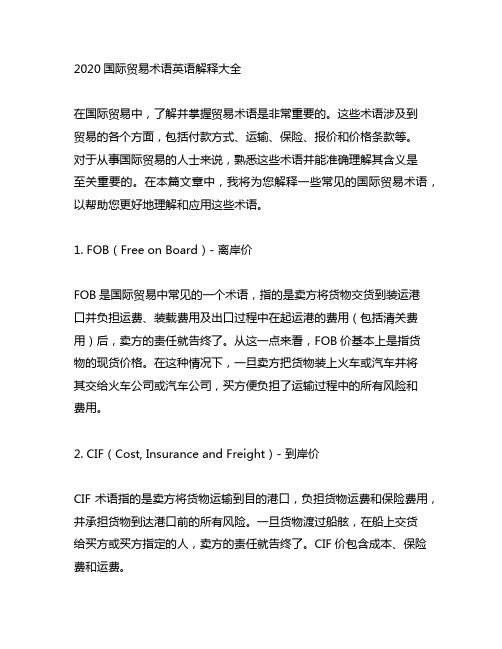
2020国际贸易术语英语解释大全在国际贸易中,了解并掌握贸易术语是非常重要的。
这些术语涉及到贸易的各个方面,包括付款方式、运输、保险、报价和价格条款等。
对于从事国际贸易的人士来说,熟悉这些术语并能准确理解其含义是至关重要的。
在本篇文章中,我将为您解释一些常见的国际贸易术语,以帮助您更好地理解和应用这些术语。
1. FOB(Free on Board)- 离岸价FOB是国际贸易中常见的一个术语,指的是卖方将货物交货到装运港口并负担运费、装载费用及出口过程中在起运港的费用(包括清关费用)后,卖方的责任就告终了。
从这一点来看,FOB价基本上是指货物的现货价格。
在这种情况下,一旦卖方把货物装上火车或汽车并将其交给火车公司或汽车公司,买方便负担了运输过程中的所有风险和费用。
2. CIF(Cost, Insurance and Freight)- 到岸价CIF术语指的是卖方将货物运输到目的港口,负担货物运费和保险费用,并承担货物到达港口前的所有风险。
一旦货物渡过船舷,在船上交货给买方或买方指定的人,卖方的责任就告终了。
CIF价包含成本、保险费和运费。
3. L/C(Letter of Credit)- 信用证信用证是国际贸易中的一种支付方式。
它是银行根据进口商的委托,于进口商付清或接受开立行票与贸易交单之条件下,信用证的受益人(出卖人)或指示人(承兑人)提供贸易交单提取货款的一种付款担保方式。
4. Incoterms(International Commercial Terms)- 国际贸易术语Incoterms是由国际商会发布的一套国际贸易术语,旨在统一全球范围内通用的贸易术语,以便跨国贸易中买卖双方能够更好地理解彼此的义务和责任。
这些术语规定了买卖双方在货物运输过程中的责任分工、货物交付和传输风险。
5. WTO(World Trade Organization)- 世界贸易组织世界贸易组织是一个由159个成员国组成的国际组织,致力于推动全球贸易自由化和贸易规则的制定。
国际贸易术语解释2020

国际贸易术语解释2020国际贸易术语在2020年并没有发生大的变化,但以下是一些常见的国际贸易术语及其解释:●FOB(Free On Board):装运港船上交货价。
卖方负责将货物交至装运港上船,并负担费用,买方负责支付海运费用。
●CIF(Cost, Insurance, and Freight):到岸价。
卖方负责支付货物到达目的港所需的费用、保险费用和海运费用,但不包括卸货费用。
●EXW(Ex Works):工厂交货价。
买方负责支付所有的运输费用、关税和其他费用,并承担货物离开卖方工厂的一切风险。
●CPT(Carriage Paid To):运费付至价。
卖方负责支付货物运输至目的地国家境内所需的费用,但不包括进口国家内的交货费用。
●DAP(Delivered At Place):到达某地价。
卖方负责支付货物运输至目的地并交付到指定地点的所有费用,但不包括卸货费用。
●DDP(Delivered Duty Paid):无税交货价。
卖方负责支付所有费用,包括货物运输、保险、进口关税和交货至买方指定地点的费用。
●L/C(Letter of Credit):信用证。
买方通过银行开立信用证,保证在卖方履行合同条件时支付货款。
●T/T(Telegraphic Transfer):电汇。
货款通过电汇方式支付,是一种常见的国际贸易结算方式。
●Incoterms(International Commercial Terms):国际贸易术语,规定了在国际贸易中卖方和买方之间责任和费用的分担原则。
●HS Code(Harmonized System Code):商品编码,用于在国际贸易中标识不同种类的商品。
这些术语在国际贸易中经常被使用,卖方和买方需要了解这些术语的含义,以确保双方在合同履行和结算过程中的权利和责任清晰明确。
最新贸易术语 Incoterms 2020

10
F组:FCA, FAS, FOB的区别
贸易 术语
英文释义
中文释义
交货地点
风险的转移
FCA
Free Carrier (place of delivery)
货交承运人 (指定交货地点)
指定装运地点
货交承运人
出运保进 口输险口 清费费清 关用用关
CIP: Carriage & Insurance Paid to (…named place of destination) 运费保险费付至(指定目的地)
交货地点:指定装运地点
风险的转移:货交承运人
责任与费用的划分:
出口清关 Seller
运输费用 Seller
保险费用 Seller
进口清关 Buyer
8
F组:FCA, FAS, FOB
FOB: Free on Board (…named port of shipment) 装运港船上交货(指定装运港)
交货地点:装运港船上
风险的转移:货物装载到船上时
责任与费用的划分:
出口清关 Seller
运输费用 Buyer
保险费用 Buyer
进口清关 Buyer
可理解为CIF = FOB Cost + Insurance + Ocean Freight (以海运为例) CIF只适用于水路运输,如海运和河运。承运人由Seller指定。 注意:CIF中的保险是Seller帮Buyer代买的,但海运风险还是Buyer的,如果在海运 中货物损失是由Buyer索赔。
FCA适用于任何运输方式。承运人由Buyer指定。
贸易术语解释通则2020英文版

贸易术语解释通则2020英文版Hey there! If you're into international trade or just curious about how business is done across the globe, you've got to know about the Incoterms® 2020 in English. It's like a secret codebook for traders, but way more accessible than you might think.Let's start with FCA (Free Carrier). Imagine you're a small business owner, Sally. Sally makes amazing hand - crafted jewelry. She has an order from a customer overseas. With FCA, Sally's responsibility ends when she hands over the goods to the carrier she has chosen at her factory or warehouse. It's like when you pass the baton in a relay race. You've done your part, and now it's someone else's turn. For example, if Sally hands over the beautifully packaged jewelry boxes to DHL at her workshop, her job as per FCA is done.Then there's CPT (Carriage Paid To). This one's a bit different. Say you're Tom, a furniture exporter. Tom has to arrange and pay for the transportation of the goods to the named destination. It's as if you're sending a gift to a friend. You don't just give it to the postman at your door, you also pay for it to reach your friend'splace. So, Tom pays for the shipping all the way to the customer's city.DAP (Delivered At Place) is another interesting one. Picture this: You're Lucy, a flower grower. You have a contract to send fresh flowers to a hotel in another country. With DAP, you have to deliver the flowers right at the hotel's doorstep. It's not just about getting them to the airport or the city. It's like you're a pizza delivery person. You don't just leave the pizza at the end of the street, you take it right to the customer's door.The Incoterms® 2020 in English are not just some boring rules. They are the lifeblood of international trade. They help clear up so much confusion and prevent misunderstandings between buyers and sellers all around the world. Without these terms, it would be like trying to play a game without knowing the rules. It'd be chaos!I think understanding the Incoterms® 2020 in English is crucial for anyone involved in international trade. It's not just about making money, it's about building trust and having a smooth business relationship. It's like having a common language that everyone in the trading world can speak and understand. So, don'tshy away from learning about it. Dive in and explore!。
- 1、下载文档前请自行甄别文档内容的完整性,平台不提供额外的编辑、内容补充、找答案等附加服务。
- 2、"仅部分预览"的文档,不可在线预览部分如存在完整性等问题,可反馈申请退款(可完整预览的文档不适用该条件!)。
- 3、如文档侵犯您的权益,请联系客服反馈,我们会尽快为您处理(人工客服工作时间:9:00-18:30)。
EXW (insert named place of delivery)GUIDANCE NOTEThis rule may be used irrespective of the mode of transport selected and may also be used where more than one mode of transport is employed.It is suitable for domestic trade, while FCA is usually more appropriate for international trade.“Ex Works” means that the seller delivers when it places the goods at the disposal of the buyer at the seller’s premises or at another named place (i.e., works, factory, warehouse, etc.). The seller does not need to load the goods on any collecting vehicle, nor does it need to clear the goods for export, where such clearance is applicable.The parties are well advised to specify as clearly as possible the point within the named place of delivery, as the costs and risks to that point are for the account of the seller. The buyer bears all costs and risks involved in taking the goods from the agreed point, if any, at the named place of delivery.EXW represents the minimum obligation for the seller. The rule should be used with care as:a) The seller has no obligation to the buyer to load the goods, even though in practice the seller may be in a betterposition to do so. If the sel ler does load the goods, it does so at the buyer’s risk and expense. In cases where the seller is in a better position to load the goods, FCA, which obliges the seller to do so at its own risk and expense, is usually more appropriate.b) A buyer who buys from a seller on an EXW basis for export needs to be aware that the seller has an obligation toprovide only such assistance as the buyer may require to effect that export: the seller is not bound to organize the export clearance. Buyers are therefore well advised not to use EXW if they cannot directly or indirectly obtain export clearance.c) The buyer has limited obligations to provide to the seller any information regarding the export of the goods. However,the seller may need this information for, e.g., taxation or reporting purposes.EXW——工厂交货(……指定地点)本条规则与(当事人)所选择的运输模式无关,即便(当事人)选择多种运输模式,亦可适用该规则。
本规则较适用于国内交易,对于国际交易,则应选FCA[1] “货交承运人(……指定地点)”规则为佳。
“工厂交货(---指定地点)”是指当卖方在其所在地或其他指定的地点(如工场(强调生产制造场所)、工厂(制造场所)或仓库等)将货物交给买方处置时,即完成交货。
卖方不需将货物装上任何运输工具,在需要办理出口清关手续时,卖方亦不必为货物办理出口清关手续。
双方都应该尽可能明确的指定货物交付地点,因为此时(交付前的)费用与风险由卖方承担。
买方必须承当在双方约定的地点或在指定地受领货物的全部费用和风险。
EXW 是卖方承担责任最小的术语。
它应遵守以下使用规则:a)卖方没有义务为买方装载货物,即使在实际中由卖方装载货物可能更方便。
若由卖方装载货物,相关风险和费用亦由买方承担。
如果卖方在装载货物中处于优势地位,则使用由卖方承担装载费用与风险的FCA术语通常更合适。
b)买方在与卖方使用EXW术语时应知晓,卖方仅在买方要求(更符合术语特质)办理出口手续时负有协助的义务:(但是),卖方并无义务主动(更强调最小义务,吸收进2010年本身的意义)办理出口清关手续。
因此如果买方不能直接或间接地办理出口清关手续,建议买方不要使用EXW术语。
c)买方承担向卖方提供关于货物出口之信息的有限义务。
但是,卖方可能需要这些用作诸如纳税(申报税款)、报关等目的的信息。
FCA - Free Carrier (insert named place of delivery)GUIDANCE NOTEThis rule may be used irrespective of the mode of transport selected and may also be used where more than one mode of transport is employed.“Free Carrier” means that the seller delivers the goods to the carrier or another perso n nominated by the buyer at the seller’s premises or another named place. The parties are well advised to specify as clearly as possible the point within the named place of delivery, as the risk passes to the buyer at that point.If the parties intend to deliver the goods at the seller’s premises, they should identify the address of those premises as the named place of delivery. If, on the other hand, the parties intend the goods to be delivered at another place, they must identify a different specific place of delivery.FCA requires the seller to clear the goods for export, where applicable. However, the seller has no obligation to clear the goods for import, pay any import duty or carry out any import customs formalities.FCA——货交承运人(……指定地点)该项规则可以适用于各种运输方式(单独使用的情况),也可以适用于多种运输方式同时使用的情况。
“货交承运人”是指卖方于其所在地或其他指定地点将货物交付给承运人或买方指定人。
建议当事人最好尽可能清楚地明确说明指定交货的具体点,风险将在此点转移至买方。
若当事人意图在卖方所在地交付货物,则应当确定该所在地的地址,即指定交货地点。
另一方面,若当事人意图在其他地点交付货物,则应当明确确定一个不同的具体交货地点。
FCA要求卖方在需要时办理出口清关手续。
但是,卖方没有办理进口清关手续的义务,也无需缴纳任何进口关税或者办理其他进口海关手续。
在需要办理海关手续时(在必要时/适当时),DAP规则要求应有卖方办理货物的出口清关手续,但卖方没有义务办理货物的进口清关手续,支付任何进口税或者办理任何进口海关手续,如果当事人希望卖方办理货物的进口清关手续,支付任何进口税和办理任何进口海关手续,则应适用DDP规则。
CPT – Carriage Paid to (insert named place of destination)GUIDANCE NOTEThis rule may be used irrespective of the mode of transport selected and may also be used where more than one mode of transport is employed.“Carriage Paid To” means that the seller deliv ers the goods to the carrier or another person nominated by the seller at an agreed place (if any such place is agreed between the parties) and that the seller must contract for and pay the costs of carriage necessary to bring the goods to the named place of destination.When CPT, CIP, CFR or CIF are used, the seller fulfils its obligation to deliver when it hands the goods over to the carrier and not when the goods reach the place of destination.This rule has two critical points, because risk passes and costs are transferred at different places. The parties are well advised to identify as precisely as possible in the contract both the place of delivery, where the risk passes to the buyer, and the named place of destination to which theseller must contract for the carriage. If several carriers are used for the carriage to the agreed destination and the parties do not agree on a specific point of delivery, the default position is that risk passes when the goods have been delivered to the first carrier at a p oint entirely of the seller’s choosing and over which thebuyer has no control. Should the parties wish the risk to pass at a later stage (e.g., at an ocean port or airport), they need to specify this in their contract of sale. The parties are also well advised to identify as precisely as possible the point within the agreed place of destination, as the costs to that point are for the account of the seller. The seller is advised to procure contracts of carriage that match this choice precisely. If the seller incurs costs under its contract of carriage related to unloading at the named place of destination, the seller is not entitled to recover such costs from the buyer unless otherwise agreed between the parties.CPT requires the seller to clear the goods for export, where applicable. However, the seller has no obligation to clear the goods for import, pay any import duty or carry out any import customs formalities.CPT——运费付至(……指定目的港)导言这一术语无例外地用于所选择的任何一种运输方式以及运用多种运输方式的情况。
